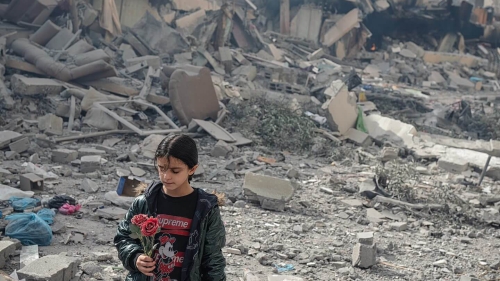Who are the Jews? Not the Blacks, of Course
The Israeli Interior Minister's recent trip to Ethiopia has once more tackled the lingering yet unanswered question of "who is a Jew", emphasizing moreover the suffering endured by the Falash Mura who are driven by their hopeless search for the Promised Land. Sharansky, who lectured the crowd of 26,000 displaced Ethiopians appeared firm and little impressed by their calls to be flown to Israel. By the end of his tour of the crowded Addis Ababa's refugee camp, the Israeli minister who is himself a Russian Jew who immigrated to Israel, firmly uttered before the homeless crowd, " Suffering doesn't make someone Jewish."
So, what does make someone Jewish? The 6500 Ethiopians who were flown to Israel in 1984-85 were certainly perceived as Jews. But much has changed since then. The Falash Mura are said to be Ethiopian Jews who converted to Christianity many years ago. But after the successful shipping of a few thousand Ethiopian Jews to Israel, thousands of Falash Mura converted back to Judaism hoping that such conversion can help to get them on the first airplane headed to Tel Aviv. In Israel however, the successful "return" of Ethiopian Jews was not as rewarding as initially hoped. To rehabilitate, educate and get the new immigrants acquainted to life in Israel, the Israeli government had to spend much more than it often spends on its average immigrants. The other problem, which appeared to be of greater significance than the availability of funding, is the fact that Ethiopian Jews are still black. We ought to remember that the basic requirement for Immigration to Israel if judged according to the standards of any modern democracy is one of great racism. And since the concept itself is engulfed in racism, it comes as no surprise, that Ethiopian Jews are treated differently than white Jews.
But living in Israel and living with discrimination was a much more preferable option over living Ethiopia in extreme poverty and famine. Those Ethiopian Jews who settled in Israel were quick to inform their families that life in the new land is a prosperous one. As a result of that message and the Israeli propaganda aimed at encouraging more Ethiopian Jews to join the earlier departures, an estimate of 18,000 Falash Mura left their homes and farms and rushed to the Israeli embassy in Addis Ababa. By the time they gathered there, Israeli officials stopped reviewing the applications. Now several compounds near the Israeli embassy stand, surrounded by hundreds of mud huts filled with thousands of displaced Ethiopians.
Natan Sharansky's visit to the area, the first visit-ever visit by an Israeli Cabinet minister regenerated the fading hope among the Falash Mura that their transferal to Israel is near. Those Ethiopians who lost everything while pursuing a mirage called the Promised Land had many reasons to display their eagerness to become Israeli citizens. While a striking famine which is likely to threaten the lives of over 7.7 million Ethiopians is already claiming the lives of those least prepared for such hardship, The Falash Mura have no other refugee but to line up before Israeli officials every morning with the same demand to review their applications. As Sharansky arrived to the embassy, a disturbing and tragic scene was already witnessed. To convince the visiting minister that they are committed Jews, Falash Mura children lined up singing Hebrew songs, women baked matza, and thousands of them sang the Israeli national anthem. While the displaced Ethiopians were trying to demonstrate their complete return to Judaism, they demonstrated the real motives behind most Jewish immigration to Israel, the attempt to escape poverty.
The Falash Mura's story indeed goes beyond the usual questionable ethic that instated the nation of Israel in the first place, displacing millions of Palestinians in the process. In fact it shed the lights on Israeli racism and an the Israeli government's apathy against those who don't fit the definition of a Jew. While Israeli religious scholars debate the Jewishness of a person based on his family lineage and the purity of his blood, the conduct of the Israeli government proves that color also matters. In a time when hundreds of thousands of Russians landed in Israel in the midst of national celebration, Ethiopian Jews were exposed to many forms of discrimination, separated from their families who have been homeless for years at the gates of the Israeli embassy in Addis Ababa.

















